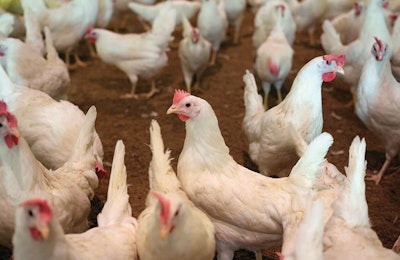
Rembrandt Foods is a vertically integrated egg products company that manages the entire process from grain to finished product. It is one of the largest egg ingredient producers in the U.S. and works with international customers as well to reach a global market.
The company supplies egg ingredients to food manufacturers, foodservice and pet food manufacturers to be included in products like mayonnaise, sauces, baked goods, confections, pasta, bars, nutritional beverages and prepared foods.
The company offers a line of cage-free products including but not limited to frozen egg products, dried egg products and liquid egg. Since 2009, it has worked with customers in the cage-free market to meet their requests.
As some U.S. states implement cage-free egg mandates and individual conversion dates loom, the market is hastily preparing for a swing in demand. As a result, supply and demand for cage-free eggs is imbalanced.
"Increased demand for cage-free eggs is on the horizon and we see it coming, but customers are not willing to commit to it yet," said Mike Gidley, Rembrandt co-founder and director of the Egg Desk, the management of supply/demand for eggs between Rembrandt and the industry.
Higher egg prices will eventually be a significant factor for those in states with new housing mandates.
"Cage-free eggs will always cost more to produce than conventional, they just will. Consumers will end up paying for those costs" Gidley said.
The company has 11.6 million birds. Of those, about 20% are cage-free, which is in line with the company's customer demand.
The marketing department at Rembrandt is hopeful consumers will be willing to pay the premium.
Holly Hansen, portfolio marketing manager, said: "Consumers will vote for cage-free legislation, but when faced with the choice while in the supermarket today, will they reach for the more expensive option?"
While Hansen's point is one that many have raised, meeting cage-free demand isn't an issue for the company.
"Our portfolio allows us to be flexible," company president Paul Hardy said. There is a cage-free liquid market Rembrandt can tap into for further processed products, he added.
"We can scale up pretty quickly, to be honest. We have birds coming in all the time. We only need a couple of months' head's up so pullets can be properly raised," he said.
Sustainability

Rembrandt Foods President Paul Hardy believes there will always be demand for sustainable conventional eggs. (Courtesy Rembrandt Foods)
While Rembrandt has made it a priority to meet customer demands, it also wants to make sure it is offering products in the most sustainable and transparent way possible.
"We are feeding the world and providing an affordable protein source to all. That is one of the main reasons I joined this company. I believe there will always be demand for more sustainable conventional eggs," Hardy said.
He went on to discuss his thoughts on all the common drivers associated with cage-free prices such as labor and construction and shared his perspective on the true "costs" of the cage-free movement.
"The additional product costs of cage free are organic to the process, but there is also a cost to the environment," Hardy said.
Gidley led the startup of Rembrandt Foods and was there when the company began housing cage-free birds in 2009. Rembrandt was one of the first to supply cage-free egg products before it was popular.
"It's pretty simple: Cage-free barns require more land. The birds eat more and drink more. They leave behind a larger carbon footprint," Gidley said.
Ultimately, animal welfare takes priority over certain housing labels. It comes down to a commitment to best practices over what he feels are misguided perceptions.
"We absolutely want to do what's best for our flocks. Unhealthy, uncomfortable birds don't produce as well, so we need to consider all that entails," Gidley said.
Through transparency and effective communication, Hardy hopes the company's customers will understand that conventional housing systems are a very sustainable way to raise eggs while maintaining the well-being of the layers.
"The consumer's impression of hen housing comes from animal welfare groups, instead of producers," Hardy said. Industry members "need to keep putting facts out there."
Several countries have made the move to cage-free production, so U.S. egg suppliers already have some knowledge as to what to expect in the coming years. Hardy said his many years working outside of the U.S. offered him new insight into sustainability. He believes that consumers in Germany and Japan have a better understanding of sustainable agriculture and hoped some of that may translate to the U.S. market soon.
Looking forward
As Rembrandt prepares for the future, it is considering all the factors involved: affordability, sustainability, animal welfare and new housing legislation. The company will allow demand to shape its product assortment and will alter its supply accordingly.
Transparency will continue to be a part of its identity and the company works diligently to build strong partnerships across the industry.
"We are confident that we can meet our customers' demand for cage-free eggs today and we're prepared to navigate the ever-changing landscape over the next three to five years," Hardy said.

















